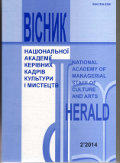SOCIAL AND CULTURAL BACKGROUND OF EUROPEAN UNIVERSITY ORIGIN AND GENESIS: THE ACADEMIC MOBILITY CONTEXT
DOI:
https://doi.org/10.32461/2226-3209.2.2014.137930Keywords:
academic mobility, education modernization, university, traditionAbstract
The university phenomenon has a great role at the modern culture. Also it is a center of aggregation of human civilization intellectual achievements. University tradition has passed through the series of social radical transformation periods.
At the result university organizational basis was changed form time to time, but it stayed to be a carrier of intellectual tradition as well as idea of University. At ХХІ century new orientations of universities development are to be searched due to powerful philosophic reflection on this problematic. Critic of modern organizational condition of universities can be described as follows: most of modern universities are not pure scientific community but strong bureaucratic organizations.
Scientists hope to substantiate concepts of higher education sphere development theoretically taking into account global scale of processes. These processes implement ideas of creation of multinational areas of higher education together with ideas of academic mobility etc. The analysis of literature has shown that problem of academic mobility processes actualization at the context of creation of global higher education areas is resonated with the universities history and it can open new ways of heuristic scientific search of efficient instruments at the sphere of education politics focused on supporting of mobility of education sphere.
So it is actually to perform an analysis of processes of origination and development of universities fundaments at European cultural tradition together with search of productive connections between the processes of universities evolution and academic mobility ideas. The university education system reformation is impossible without amplification of philosophical knowledge at the whole paradigm of university education.
We put an accent at fact of proto-forms of European Higher Education Area (EHEA) and European Research Area (ERA) existence at universities history since they were established. Researcher Yu.Sergeeva also stays on position that academic mobility has a big history even before universities establishing: it appeared before the first universities and became a basic principle of development of higher education since XII century.
Students of first universities could start education at the nearest university and continue it at another one at own country of abroad. This situation is promoted by the fact that Latin was a uniform language for education at European universities. Also the plan of study and scientific grades were almost unified. We stand on positions that we have reasons to postulate that analogue between this Middle Ages tradition and politics of diploma mutual recognition take place.
Researcher O.Dolzhenko proposes a thesis that every new stage of European culture development (Middle Ages, Renaissance etc.) was started with period when universities accented one’s attention on social-cultural knowledge. The scientist postulates that preconditions for exact sciences were originated at these periods. This point of view is evidence that universities have a role of intellectual centers of European culture and science.
At our research we performed an analysis of connections between the processes of European society transformations (since Middle Ages till present days) and genesis of fundament of University ideas. Also the influence of this genesis on implementation of academic mobility ideas was discovered at the different periods of universities history. We substantiate an idea universities genetically joined with ideas of academic freedom, search of true, autonomy of mentality and scientific creativeness. At presentUkrainetogether with European community builds the areas of higher education and researches by means of activation of academic exchanges. From one side, this approach is normatively fixed atBolognaprocess documentation. From another side, it is a new birth of important education tradition which takes place and get active at variant degrees during the whole history of university education. We developed an idea that academic mobility as one of important fundaments of universities as social institutions.
At our research we analyzed and developed ideas of following scientists: A.Gotlib, O.Dolzhenko, O.Isaeva, S.Klepko, M.Mykhalchenko, V.Kremen, L.Murashova, Ya.Pelikan, A.Rzhevska, Yu.Sergeeva, S.Smirnov, V.Sadovnichiy, V.Friyhoff, V.Shmidt-Wiggeman.
Downloads
Published
Issue
Section
License
Authors who publish with this journal agree to the following terms:
1. Authors retain copyright and grant the journal right of first publication with the work simultaneously licensed under a Creative Commons Attribution License that allows others to share the work with an acknowledgement of the work's authorship and initial publication in this journal.
2. Authors are able to enter into separate, additional contractual arrangements for the non-exclusive distribution of the journal's published version of the work (e.g., post it to an institutional repository or publish it in a book), with an acknowledgement of its initial publication in this journal.
3. Authors are permitted and encouraged to post their work online (e.g., in institutional repositories or on their website) prior to and during the submission process, as it can lead to productive exchanges, as well as earlier and greater citation of published work (See The Effect of Open Access).


